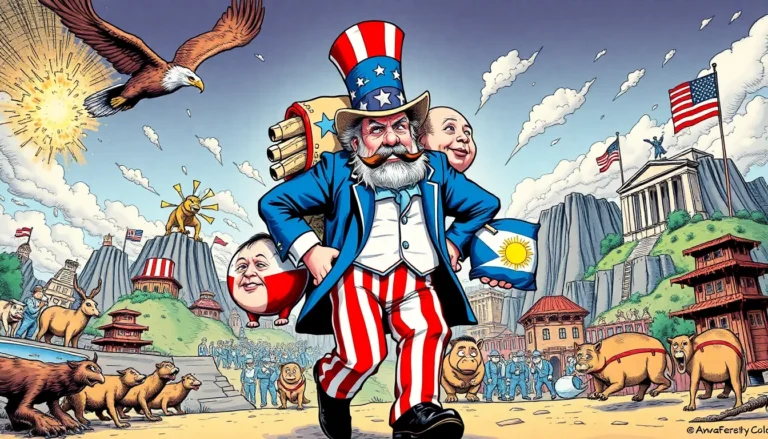In a world where political parties seem to multiply faster than rabbits, it’s time to have a little fun. Fake political party names offer a hilarious glimpse into the absurdity of politics. They can make anyone chuckle while also sparking a conversation about the serious issues behind the satire.
Table of Contents
ToggleOverview of Fake Political Party Names
Fake political party names serve as a creative means to comment on the political environment. Various names draw inspiration from real political movements, yet they twist the concepts to provoke thought and laughter. Many organizations and individuals use these names to highlight flaws in political ideologies or systems.
Examples of fake political party names include the “Nihilists for a Brighter Future” and the “United Front for the Rejection of Common Sense.” Such playful titles resonate in popular culture, appearing in satire and parodies across various media channels. Humor emerges as a tool, allowing these names to engage audiences while unpacking serious political issues.
The rise of social media has amplified the reach of these names, fostering discussions and memes that challenge traditional notions of politics. Many people find solace in humor amidst political chaos, sharing these names for comedic relief. As these names circulate, they encourage a reconsideration of political engagement and inspire conversations on the seriousness of the electoral process.
Fake political party names illustrate the absurdity of real-world politics. They promote reflection and dialogue on societal issues through satire. People recognize the intentional exaggeration in these titles, which often leads to an examination of the values politicians claim to uphold. Through humor and creativity, fake political party names contribute to a broader discourse on democracy and civic responsibility.
Historical Context
Fake political party names emerged as critical commentary on the political landscape, often reflecting societal issues through humor. Using satire fosters more profound discussions about political norms and expectations.
Origins of Fake Party Names
Fake party names trace back to satirical movements aimed at critiquing established political systems. This phenomenon gained momentum during the 20th century, especially with the rise of countercultural movements. The combination of humor and social commentary captured public attention, making audiences more aware of the absurdities inherent in politics.
Notable Examples in History
Several notable fake political party names exemplify this trend throughout history. “The Monster Raving Loony Party” in the UK capitalized on satire to mock traditional politics. Additionally, the “Pirate Party” emerged not as a literal piracy advocate but as a response to digital rights issues. “The Party for Animals” serves as another humorous take on political discourse by emphasizing animal rights while ridiculing conventional party platforms.
Cultural Impact
Fake political party names significantly impact public perception and political discourse. These names often challenge traditional views, prompting individuals to question established political norms. They serve as a vehicle for humor, allowing people to engage with serious issues lightly. As such, they often resonate with younger audiences seeking alternatives to conventional political dialogue.
Influence on Public Perception
Altered perceptions of political parties stem from satirical names. Public engagement increases when humor is involved, enhancing discussions around legislative challenges. Reflective, these names encourage critical thinking about political choices. As voters encounter unconventional titles like “The Monster Raving Loony Party,” they’re inspired to reflect on the structure of actual political parties. Engagement levels surge as they become aware of the absurdity within the system, promoting healthier conversations about governance and civic participation.
Use in Political Satire
Political satire leverages fake party names to critique systems and figures. These names often appear in comedy shows, cartoons, and social media, widening their reach. By presenting exaggerated versions of political ideologies, satire helps underscore flaws in real policies. Comedic influence shapes how the public perceives political issues, making them more approachable. This method fosters increased awareness and discourse, pushing society to consider the implications of actual political actions.
Creativity and Humor
Fake political party names blend creativity and humor, providing an entertaining lens through which to view political issues. These names often serve as a spark for discussions about serious topics.
The Role of Satire in Politics
Satire plays a crucial role in shaping political discourse. It highlights absurdities within political systems and challenges norms. By amplifying humor, satire invites individuals to question the status quo. The exaggerated portrayal of real political ideologies offers clarity and insight into established political practices. Audiences experience a sense of relief when humor transforms complex issues into approachable subjects. Consequently, satire fosters a more engaged and informed public, encouraging diverse perspectives on governance.
Memorable Fake Party Names
Memorable fake party names stick in people’s minds and spark conversations. Names like “The Monster Raving Loony Party” showcase humor while critiquing traditional politics. Creative names resonate with younger audiences seeking alternatives and motivate them to engage in the political process. Other examples include “Nerds United for Common Sense” and “The Party of Non-Committal.” These names not only entertain but also provoke thought about real political matters. Humorous labels like these contribute to the larger narrative by prompting reflection and dialogue about societal issues.
Contemporary Usage
Fake political party names find significant traction in today’s society. These names spark conversation, providing both humor and critical commentary.
Online Trends and Social Media
Social media platforms amplify the reach of fake political party names, creating viral trends. Users share and engage with these names through memes and quips, fostering a culture of satire that resonates widely. Memes like “The Party of Sleepy Cats” or “Society of Bad Decisions” circulate rapidly, leading to broader discussions about serious political issues. Engagement grows as these creative names make politics more accessible, especially among younger users. The blend of humor and current events captivates audiences, prompting a reassessment of political participation.
Case Studies of Recent Examples
Recent examples showcase the impact of fake political party names on public discourse. The “Rock n’ Roll Party” emerged, highlighting youth involvement in political engagement. Another example, “Math Wizards for a Better Tomorrow,” emphasizes the importance of education reform in a lighthearted manner. These names illustrate how satire can effectively communicate serious topics. Each name reflects cultural sentiments, bridging the gap between humor and meaningful commentary in politics. Organizations utilize these names to connect with audiences uniquely, demonstrating a growing trend in political strategy.
Fake political party names serve as a unique lens through which society can view the complexities of the political landscape. They blend humor with critical commentary, allowing individuals to engage with serious issues in a lighthearted manner. As these names gain traction on social media, they not only entertain but also provoke thought and inspire dialogue about civic responsibility.
The creativity behind these names reflects a desire for change and a challenge to traditional political norms. By encouraging discussions among diverse audiences, fake political party names play an essential role in redefining political engagement. Ultimately, they remind us that humor can be a powerful tool for reflection and transformation in the realm of politics.





